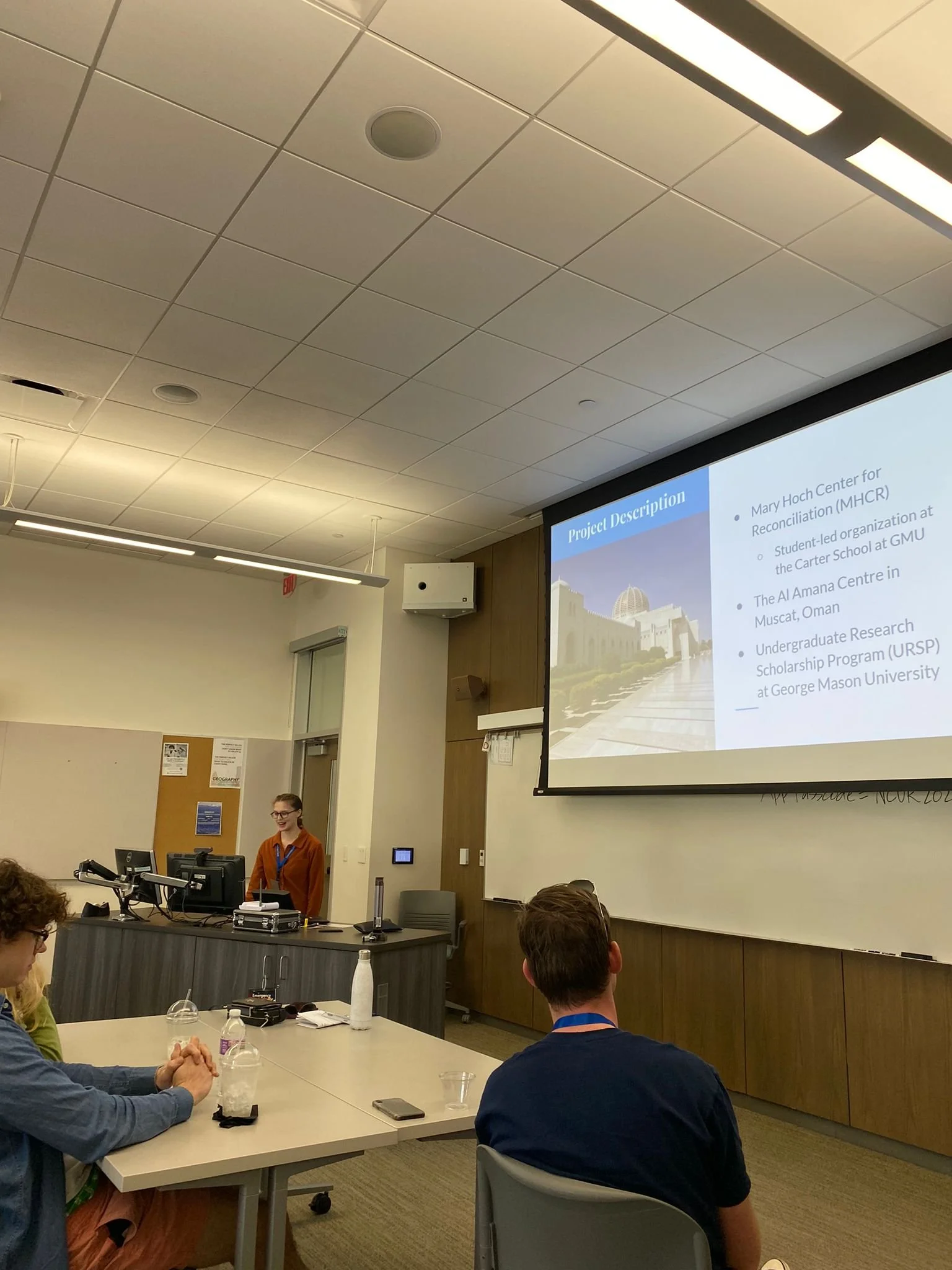By: Greta Roberson
Working at the Mary Hoch Center for Reconciliation has granted me many firsts such as: making my first academic CV, conducting my first research interviews, and writing my first policy brief. During my first semester at MHCR, I was able to couple the internship with earning George Mason University’s minor in Conflict Analysis and Resolution Studies. By having both work and study combined, I had a way of learning about peace and conflict from both scholars and practitioners. One complemented the other seamlessly. I was improving my writing inside and outside the classroom while learning theories, listening to guest speakers, and coming to work to produce more knowledge in the field.
Shaping My Skills
Knowing what I know now, I would apply for MHCR again instantly. If it were not for the work I have produced with my colleagues, I would be on an incredibly different path after graduating from George Mason University. My transition from working as a lifeguard to a peace-oriented internship made it possible to narrow down my interest and broaden my skills. For instance, I was first introduced to technical writing in one of Mason’s core courses. Still, I did not see how things come together outside the classroom until I began writing my first literature review under direct supervision.
One of my first tasks was to look for research conferences, and that was also at the same time when I considered how knowledge is produced and circulated within an academic field. Through weekly tasks, drafting skills and abstract writing became more straight forward. I began to value the writing process more and see how edits elevated my work. Later I improved my confidence in conducting interviews with people across various backgrounds. The combination of mentorship and independence in the workspace allowed me the flexibility to truly flourish and own my craft. It has been incredible to transfer the skills I have always used in the classroom and transition them to a professional setting.
Newfound Interest
Before arriving at MHCR, I was interested in conflict topics particularly regarding extremism and forms of violence that appear as acts of terrorism or state-led persecution. Later as I began working and started courses at the Carter School, I learned so much about what happens after the violence – something not often considered in political science circles. I learned new terminologies like conflict reconciliation, transformation, transitional justice, and truth commissions. Before entering the field, I learned about grievances and systemic injustices but there was little consideration of victims and what communities go through after conflict has occurred. There is something lost in other academic fields that peace and conflict studies provided me with.
Networking
Thanks to MHCR’s tight network, everyone is incredibly wiling to offer advice, talk about their experience, and provide insights into their background. Also, everyone carries their specialties with them into MHCR – from well-being and resilience studies to psychology or law. With everyone being an email away, I have had the opportunity to ask questions at any moment.
One of the most influential conversations I had with MHCR staff was with Colette Rausch, a Research Professor affiliate and Think Peace Learning & Support Hub convener. After discussing her professional experiences, I concluded that law is one of the best approaches to preventing and reconciling conflict. International law and traditional forms of restorative justice play a critical role in acting as precedents and ensuring that perpetrators are tried for their crimes and victims are restored
with integrity and truth. That confidence was substantiated when I took a course in War Crime Trials and listened to the experience of my professor Dr. Andrew Novak and his network of colleagues about the various roles and responsibilities of within international law to provide remedy.
After Graduation
I would not be as confident to pursue graduate school, nor would I have developed such an interest in conflict studies without MHCR. This and last semester have been spent looking at graduate programs abroad. To cast a wide net, I have searched for programs ranging in International Relations, Global Studies, or Peace and Conflict Studies. I will primarily focus on issues that highlight human rights, transnational crime, political extremism, and terrorism. Thankfully I will be able to carry the guidance and communal knowledge given to me by everyone at MHCR.
Come the Fall 2023 semester, I will be studying in Europe to pursue a Master’s degree, become fluent in a new language and begin on an exciting new path by growing my network and knowledge abroad. After graduate school, I hope to be involved in an international non-governmental organization working on human rights issues and humanitarian efforts. The Mary Hoch Center for Reconciliation was the perfect stepping stone and has taught me so much – not just in skills – but also about myself.
Greta presenting at the National Conference on Undergrad Research (NCUR) (Photo: Unnamed, Author’s Personal Collection)

